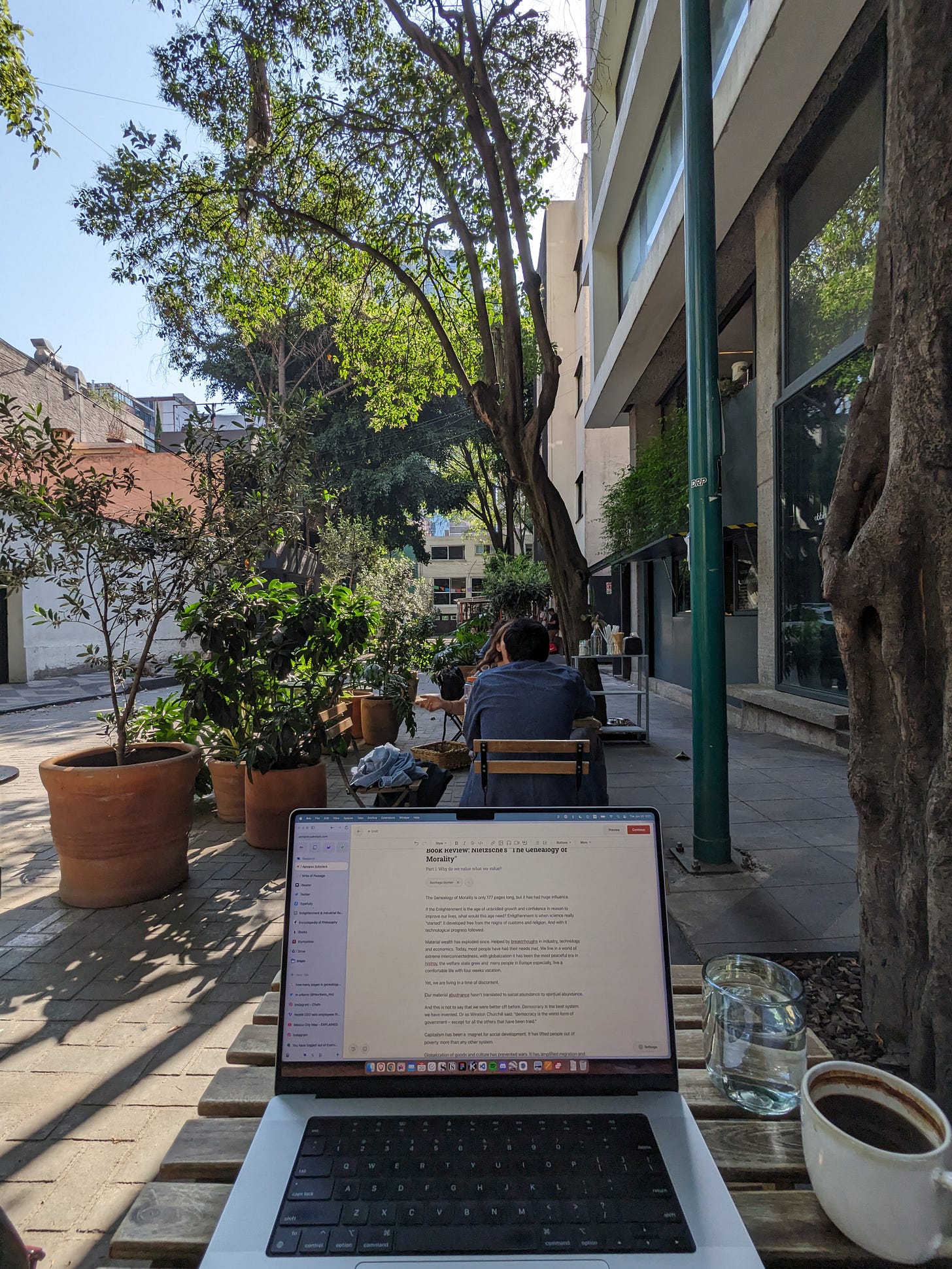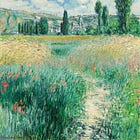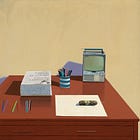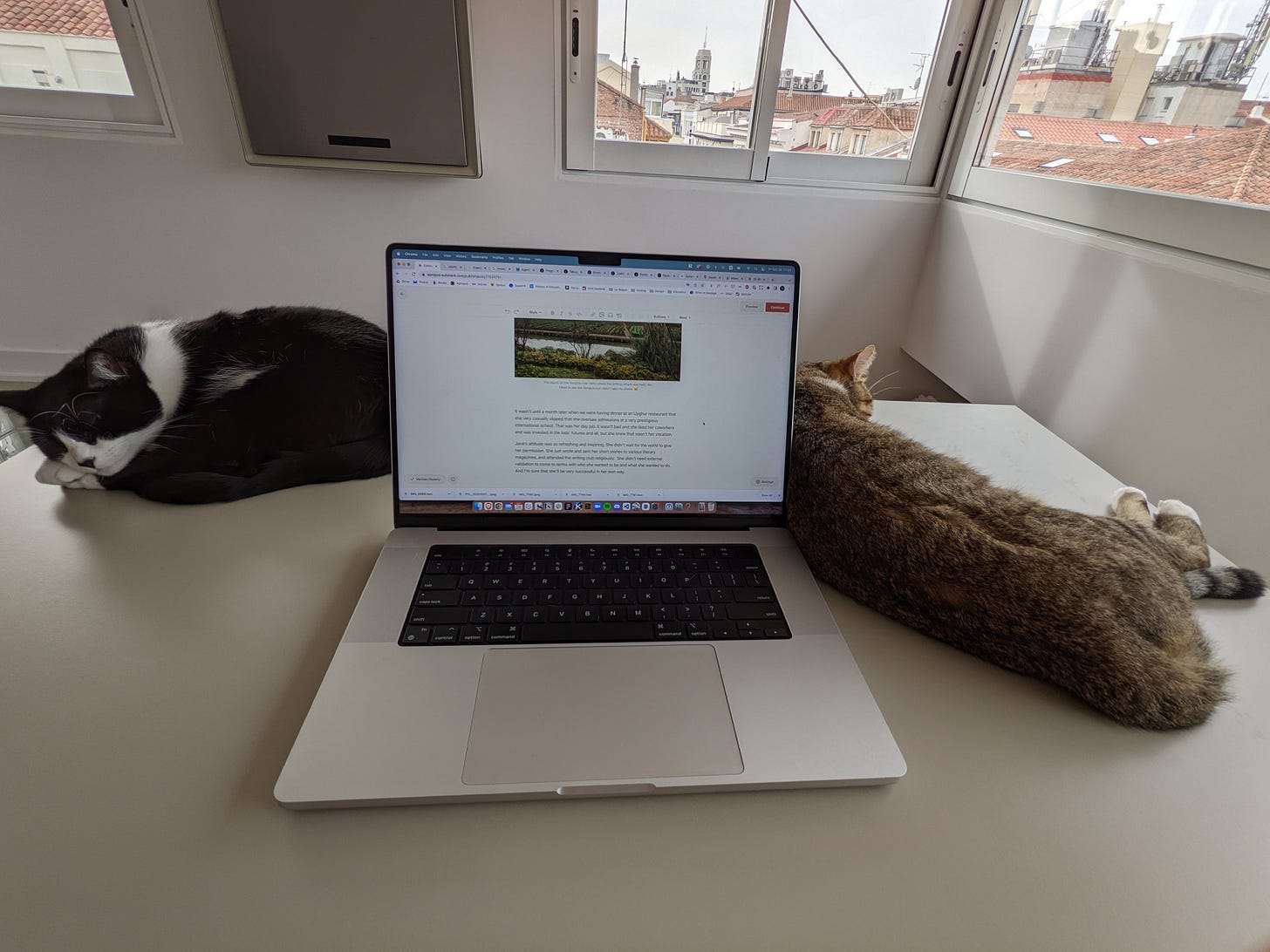What I Learned Publishing an Essay Every Day for 30 Days
No hacks, no prep, just a bold commitment.
Thirty days ago I gave myself a wild test: publish one essay every day.
I use the word essay intentionally: it comes from the French essai—a trial, an attempt. That feels right. After all, my writing is an attempt to grasp the world we live in. Not a final assessment. I write to make sense, to answer questions I have, to offer explanations. It’s never finished because I’m always learning about the world— traveling, reading, talking to people, living. The value is in the act, in showing up, in shaping a thought that did not exist an hour before. (And yes, I like the nod to the father of the essay: Montaigne)
Over these thirty days I wrote about gardens and China, vernacular architecture and my Mexicanness, English as the language of the internet, Bertrand Russell and Peter Thiel, the coming multipolar world order, and growing older.
Some of my favorites:
Now on to the learnings:
Deadlines remove friction.
It didn’t matter that I didn’t feel well, that I was traveling, or that I didn’t know what to say. I wrote. Ideas came. And action begets more action.
It’s paradoxical but the constraints of publishing daily created the focus I thought I lacked. I could go on for 3 or 4 hours of flow without stopping. For a week during my trip to China I woke up early, wrote a rough draft, then went exploring, came back, edited it and shipped. The deadline didn't care about my excuses, and eventually neither did I.
Procrastination really is my biggest enemy. If you wait for perfect conditions, you’ll move at snail pace (or worse, not at all).
Try to avoid the blank page.
I keep a (very) long inbox of notes: observations, questions I can’t shake, bits from books, things friends say. Fleeting thoughts do not wait. When I catch them, they become raw material I return to when deciding what to write.
My essay on English as the language of the internet came from a conversation with my friend Hugo about a year ago. The one about getting older started with an observation of a Gen Z outfit in a café in Mexico City.
Hemingway had this thing of stopping when he was “going good” and knew what would happen next”. That way, the next day he could just get on with it. Same principle: leave yourself breadcrumbs.
When you have no ideas, start writing.
Some days the notes weren’t helpful, so I began with morning pages. I’ve kept this practice—originally prescribed by Julia Cameron in The Artist’s Way—for five years, and it’s a game changer. The idea is to write three pages fast, longhand, in a stream of consciousness. After one page of mumbling, whatever is in your head comes out. At first it’s usually bottled-up feelings. Keep going and it’s kind of crazy but fully fledged ideas appear, things you didn’t even know were there.
This is by far the best activity if you’re feeling blocked. The unconscious has things to say but it needs the conscious mind to get out of the way first.
Evidence builds agency.
After this month, I feel so confident and I’m thinking about other commitment challenges. I’ve been on and off with a sci-fi novel for years; this might be the time to tackle it.
But it's deeper than just confidence. Each published essay becomes evidence—physical proof that I can create something from nothing, day after day. We tell ourselves stories about what we can and cannot do, but those stories are mostly fiction. The real story is written through action.
Accomplishing difficult things gives you evidence, and evidence kills the myths we tell about our limitations. It becomes a reinforcing cycle in favor of your agency.
Writing every day makes you more present.
Every day I was more attuned to my surroundings, more conscious of my experiences and my thoughts. I paid closer attention.
When I wrote about the vernacular architecture of Yunnan, it was because I couldn’t stop looking at the buildings, noticing the brickwork, how wood darkens where hands touch it, how a town’s building method shifts depending on the geography.
Life becomes research, it’s great.
The bolder the commitment, the likelier you’ll keep it.
I already had a somewhat stable writing process. I’d published around forty essays pieces before committing to one a day. For months I considered once a week but it felt like too much pressure.
Well, after doing this every day, once a week sounds like an easy goal. Imagine having extra days to polish the piece more, to deepen on the ideas, to just take a break? Sounds like a dream!
The lesson is that we underestimate ourselves systematically. There will never be a perfect time to start, so just start. Sometimes the more audacious goal is easier because it leaves no room for negotiation with yourself.
My writing is all over the place, but there are big themes.
Like I wrote in my favorite problems piece, there’s some method to the madness.
Looking back at the thirty pieces, they seem scattered—vernacular architecture one day, Peter Thiel the next. But you can see the patterns; I keep returning to the same questions: How do we build a prosperous society? Where do people find meaning? How do civilizations rise and evolve?
I feel another thread in my writing is mixing my experience with larger trends, the small and the big. The piece that resonated with most people mixed the two—my notes from China. It blew up and ended up with 15,000 views.
What does the future hold?
More ambition, but the right kind. I want to take on larger questions, read the books that shaped civilizations, engage the thinkers who built them, and go deep into the rabbit holes that matter.
Writing is how I wrestle with the questions that leap at me in this beautiful, chaotic world: How do we build good lives? How do we create meaning instead of waiting for it? How do we make our families stronger, our neighborhoods kinder, our cities more livable?
I have no credentials, no platform, no special authority—just my particular way of seeing. What I can offer is sincerity over cynicism, substance over spectacle, depth over noise.
So I'll keep going, sharing what I find with anyone who wants to think alongside me. If a community forms here, let it grow because we're trying to see more clearly together. Not for clout or metrics but for the quiet joy of making sense in public.
Montaigne said: “When I express my opinions it is so as to reveal the measure of my sight not the measure of things.”
After 30 days of daily essays, my sight hasn't necessarily improved, but I've learned to trust it more. Each essay was a small trial, a test of attention and courage. And man does it take courage to say something out loud to the world.
The attempt is the thing. Everything else is bonus.
postscript 📮
I can’t believe I’m typing this: essay 30/30. I did it, the publishing blitzkrieg is over!
Honestly, I don’t even know what to ask you guys, just know that I’m going to watch a good movie, get a cup of tea, and sleep at 11 pm on a Friday like a respectable thirty-five-year-old.







